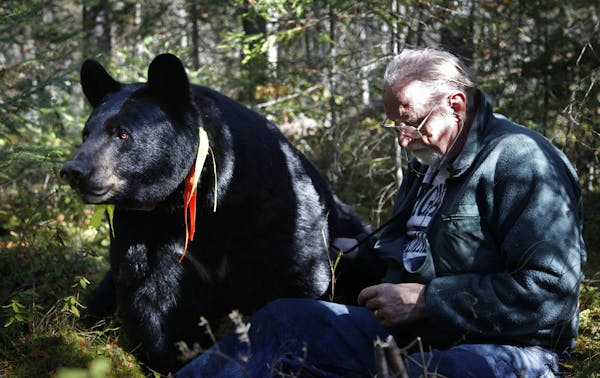Minnesota's controversial bear researcher, Lynn Rogers, can keep collars on 10 bears — for now.
But in a compromise reached with the help of a Ramsey County judge on Monday, Rogers and state wildlife officials agreed that for the most part he will stop hand-feeding his bears and cease broadcasting den-cam video to hundreds of school classrooms across the country.
Rogers' practice of hand-feeding bears taught the animals to see humans as a source of food, creating a risk to the public, according to officials at the Minnesota Department of Natural Resources (DNR), who moved last month to cancel Rogers' state research permit. Rogers sued, leading to Monday's court hearing.
DNR spokesman Chris Niskanen said state officials wanted an agreement that allowed Rogers to continue his research but protected the public. The education component, he said, was less important than the research; the agreement allows Rogers' researchers to copy the den-cam video onto DVDs that can be sent to the schools.
Under the agreement, tracking collars can remain on the 10 bears that wear them now, but no more can be added even if one bear dies. Rogers can place video cameras in two dens to record bear hibernation, and he can complete the four wildlife research classes that are scheduled for August; but if he or other researchers need to approach and feed a collared bear to change a battery or collect data, visiting students must stay 150 feet back.
Sue Mansfield, Rogers' co-researcher, said hundreds of schoolchildren would be disappointed by the end of the streaming bear video, but praised the agreement for allowing the researchers to continue monitoring their bears. "That's the most important thing," she said after Monday's court hearing. Rogers did not attend the proceedings.
The underlying issue — whether Rogers can renew his research permit — now goes before an administrative law judge, a process expected to take six to nine months.
Last month, DNR Commissioner Tom Landwehr announced that he would not renew the annual permit that allows Rogers to collar the bears and set up webcams in the bears' dens.
DNR officials say they have received a rising number of complaints from neighbors in the Ely area who had run-ins with bears that have lost their fear of humans.
Since 2009 the DNR has received a total of 69 complaints from area residents, the agency said in court filings. In 2011, a group of 38 people signed a letter protesting the renewal of Rogers' permit because, they said, his collared bears posed a risk to children among others.
Rogers denies that his bears are a risk: He said many people in the Ely area feed bears, and said there has never been a bear conflict that resulted in an injury to a person.
Bear on deck
But state wildlife officials say hand-feeding bears is different from erecting bird feeders or setting out food for bears. Rogers hand-feeds his collared bears, and others have reported that he and guests, who pay $2,500 for a three-day stay at the Wildlife Research Institute, hand-feed even uncollared bears routinely.
An affidavit submitted by the state from one former guest described how a bear tried to bite her on the center's deck when she didn't have any food for it. She said guests were allowed to mingle with bears unsupervised, and were encouraged to feed them by hand.
Monday's agreement does not address such activity around the research center, Niskanen said. The DNR permit addresses only collared bears and den cameras. There is no law against feeding bears in Minnesota, "though we strongly discourage it," he said.
In requesting a temporary restraining order against the DNR, Rogers argued that his research would suffer "irreparable" harm if he had to remove the collars from the bears by July 31 and if he were not allowed to set up den cameras.
Rogers also appealed his case to Gov. Mark Dayton, who declined to intervene but ordered the review by an administrative law judge.
Rogers has a following of hundreds of thousands of Facebook, Twitter and Web devotees. Supporters donated $600,000 to the Research Institute and the expansive North American Bear Center, which he heads. In recent weeks, pleas posted on the websites have generated $42,000 in donations to help with legal costs.
Josephine Marcotty • 612-673-7394
The Latest | Jury selection in Trump's hush money trial stretches into 2nd day with more dismissals
Biden returns to his Scranton, Pennsylvania, roots to pitch his plan for higher taxes on the rich
Microsoft invests $1.5 billion in AI firm G42, overseen by UAE's national security adviser

